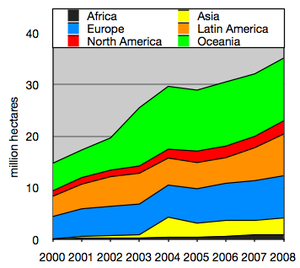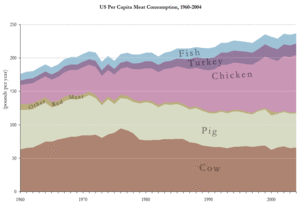
Population growth is a huge strain on the environment. Reducing family size is vital to saving the Earth, no matter how much the notion upsets some folks. Feeding the world‘s 7,013,987,392 people is a challenge and often cited as to why organic food is not as green as consumers believe. In my opinion, this is just a myth.
Yes, we can feed the world organically!
Marc Gunther writes for GreenBiz.com:
New scientific research points to a key drawback of organic agriculture, unfortunately: It is typically less efficient and productive than conventional growing methods. That’s a problem for fans of organic because the world has a limited supply of farmland, a billion or so undernourished people, a growing population, an expanding middle class and therefore a vast appetite for affordable and nourishing food.
If, in fact, organic methods are less productive, scaling up the production of organic food at will require more land, contribute to deforestation and cost more than growing our food using conventional methods. That suggests that organic methods alone can’t feed the world in a sustainable way.
Clearly, organic farming is a more environmentally friendly “method”, as Gunther points out, reducing pollution and health risks to workers from dangerous agro-chemicals; however, when “outcomes” are examined, the smaller yields of organic farms is cited as cause for concern.
I find such concerns hogwash. Given our current system of waste (both conventionally and organically) and consumption of meat, these lower yields of organic food production would not be a concern. According to a 2004 study by the University of Arizona (UA), between 40 to 50 percent of food grown is wasted and never reaches consumers. Furthermore, we waste even more food after it has left the farm. The New York Times reports:
You’d never know it if you saw what was ending up in your landfill. As it turns out, Americans waste an astounding amount of food — an estimated 27 percent of the food available for consumption, according to a government study — and it happens at the supermarket, in restaurants and cafeterias and in your very own kitchen. It works out to about a pound of food every day for every American.

And what about meat?
According to the UN, meat production is responsible for nearly a fifth of global greenhouse gas emissions. The UK’s Food Climate Research Network cites lower estimates holding food production for livestock accountable for 10 to 15 percent of emissions. Whatever the statistic, the impact of global meat production is significant, and meat consumption is up in the United States. Biofuels Digest reports:
70 percent of US corn and soy production is devoted to feed, not food, and not fuel…According to the FAO and the USDA , US meat consumption has increased 137 pounds per person since the 1950s, with a resulting increase in grain usage of 375 pounds per person (the grain fed to cattle and poultry). Cheese consumption has increased faster than milk’s decline, and Americans consume 179 extra pounds of milk, which uses up another 63 pounds of grain. In short, dietary change in the US has resulted in an additional 438 pounds of grains per capita, or 8 bushels of corn.
These statistics on food waste and meat consumption only reflect 313,562,376 of the world’s population, but other developed countries probably have similar statistics compared the US.
If we ate less meat and reduced the tremendous amount of food that is wasted currently, I do believe we could feed the world organically. That is the sort of outcome I would like to hear discussed when talking about organic versus conventional farming.
Organic method to grow vegetables and fruits has no match but due to commercialization and fast speed way of life has ruined this method. We as general, can do it in our backyards. If we take out some time to grow fruits and vegetables in our backyard, that does need our time and attention but it will benefit us as well as our next generation. Organic food has much nutrients than inorganic food.